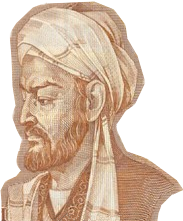
Monism attributes oneness or singleness to a concept, e.g. existence. Various kinds of monism can be distinguished:
Early Islamic philosophy or classical Islamic philosophy is a period of intense philosophical development beginning in the 2nd century AH of the Islamic calendar and lasting until the 6th century AH. The period is known as the Islamic Golden Age, and the achievements of this period had a crucial influence in the development of modern philosophy and science. For Renaissance Europe, "Muslim maritime, agricultural, and technological innovations, as well as much East Asian technology via the Muslim world, made their way to western Europe in one of the largest technology transfers in world history.” This period starts with al-Kindi in the 9th century and ends with Averroes at the end of 12th century. The death of Averroes effectively marks the end of a particular discipline of Islamic philosophy usually called the Peripatetic Arabic School, and philosophical activity declined significantly in Western Islamic countries, namely in Islamic Spain and North Africa, though it persisted for much longer in the Eastern countries, in particular Persia and India where several schools of philosophy continued to flourish: Avicennism, Illuminationist philosophy, Mystical philosophy, and Transcendent theosophy.

Tawhid is the indivisible oneness concept of monotheism in Islam. Tawhid is the religion's central and single most important concept, upon which a Muslim's entire religious adherence rests. It unequivocally holds that God in Islam is One and Single.
Syed Muhammad al Naquib bin Ali al-Attas is a Malaysian Muslim philosopher. He is one of the few contemporary scholars who is thoroughly rooted in the traditional Islamic sciences and studies theology, philosophy, metaphysics, history, and literature. He pioneered the concept of Islamisation of knowledge. Al-Attas' philosophy and methodology of education have one goal: Islamisation of the mind, body and soul and its effects on the personal and collective life on Muslims as well as others, including the spiritual and physical non-human environment.

Ṣadr ad-Dīn Muḥammad Shīrāzī, more commonly known as Mullā Ṣadrā, was a Persian Twelver Shi'i Islamic mystic, philosopher, theologian, and ‘Ālim who led the Iranian cultural renaissance in the 17th century. According to Oliver Leaman, Mulla Sadra is arguably the single most important and influential philosopher in the Muslim world in the last four hundred years.

Ekam is the Sanskrit for "one, single, solitary", as a noun meaning "unity". In Ayyavazhi and Hinduism, it refers to a concept of monism akin to that of Brahman in Advaita philosophy and Smarta theology.

Aḥmad al-Fārūqī al-Sirhindī (1564-1624), also known as Imam Rabbani, was an Indian Islamic scholar, Hanafi jurist, and member of the Naqshbandī Sufi order. He has been described by some followers as a Mujaddid, meaning a “reviver", for his work in rejuvenating Islam and opposing the newly made religion of Din-i Ilahi and other problematic opinions of Mughal emperor Akbar. While early South Asian scholarship credited him for contributing to conservative trends in Indian Islam, more recent works, notably by ter Haar, Friedman, and Buehler, have pointed to Sirhindi's significant contributions to Sufi epistemology and practices.

Fanaa in Sufism is the "passing away" or "annihilation". Fana means "to die before one dies", a concept highlighted by famous notable Persian mystics such as Rumi and later by Sultan Bahoo. There is controversy around what Fana exactly is, with some Sufis defining it as the annihilation of the human ego before God, whereby the self becomes an instrument of God's plan in the world (Baqaa). Other Sufis interpret it as breaking down of the individual ego and a recognition of the fundamental unity of God, creation, and the individual self. Persons having entered this enlightened state are said to obtain awareness of an intrinsic unity (Tawhid) between Allah and all that exists, including the individual's mind. This second interpretation is condemned as heretical by orthodox Islam.

Sufi philosophy includes the schools of thought unique to Sufism, the mystical tradition within Islam, also termed as Tasawwuf or Faqr according to its adherents. Sufism and its philosophical tradition may be associated with both Sunni and Shia branches of Islam. It has been suggested that Sufi thought emerged from the Middle East in the eighth century CE, but adherents are now found around the world.
In religion, transcendence is the aspect of a deity's nature and power that is completely independent of the material universe, beyond all known physical laws. This is contrasted with immanence, where a god is said to be fully present in the physical world and thus accessible to creatures in various ways. In religious experience, transcendence is a state of being that has overcome the limitations of physical existence, and by some definitions, has also become independent of it. This is typically manifested in prayer, rituals, meditation, psychedelics and paranormal "visions".

In Islamic philosophy, Sufi metaphysics is centered on the concept of وحدة, waḥdah, 'unity' or توحيد, tawhid. Two main Sufi philosophies prevail on this topic. Waḥdat al-wujūd literally means "the Unity of Existence" or "the Unity of Being." Wujūd, meaning "existence" or "presence", here refers to God. On the other hand, waḥdat ash-shuhūd, meaning "Apparentism" or "Monotheism of Witness", holds that God and his creation are entirely separate.
Identityism is the school of Sufi metaphysics of unity of being traditionally known as Wahdat al-Wujud or Wahdat ul-Wujood formulated by Ibn Arabi. Identityism is similar to monism in the west and nondualism and advaita vedanta in Hinduism.

In monotheistic thought, God is usually viewed as the supreme being, creator, and principal object of faith. In non-monotheistic thought, a god is "a spirit or being believed to control some part of the universe or life and often worshipped for doing so, or something that represents this spirit or being".

Interactions between the followers of Hinduism and Islam began in the 7th century, after the advent of the latter in the Arabian Peninsula. These interactions were mainly by trade throughout the Indian Ocean. Historically, these interactions formed contrasting patterns in northern and southern India. In the north of India, there is a legacy of domination by Muslim rulers and Christian rulers stretching back to the Delhi Sultanate of the 13th century. The patterns of relationship between Hindus and Muslims have been different between north and south India. While there is a history of conquest and domination in the north, Hindu-Muslim relations in Kerala and Tamil Nadu have been peaceful. However, historical evidence has shown that violence had existed by the year 1700 A.D.
Wujūd is an Arabic word typically translated to mean existence, presence, being, substance, or entity. However, in the religion of Islam, it tends to take on a deeper meaning. It has been said that everything gains its wujūd by being found or perceived by God.

Akbari Sufism or Akbarism is a branch of Sufi metaphysics based on the teachings of Ibn Arabi, an Andalusian Sufi who was a gnostic and philosopher. The word is derived from Ibn Arabi's nickname, "Shaykh al-Akbar," meaning "the greatest master." 'Akbariyya' or 'Akbaris' have never been used to indicate a specific Sufi group or society. It is now used to refer to all historical or contemporary Sufi metaphysicians and Sufis influenced by Ibn Arabi's doctrine of Wahdat al-Wujud. It is not to be confused with Al Akbariyya, a secret Sufi society founded by Swedish Sufi 'Abdu l-Hadi Aguéli.

Khawaja Muhammad Zaman of Luari was a sufi saint and poet from Sindh. His father, Shaikh Abdul Latif Siddiqi, was a descendant of first Rashidun Caliph Abu Bakr. Their forefathers had moved to Sindh in Abbasid era.

Shaykh Muhibullah Allahabadi, or Muhibb ullah Ilahabadi was a Sufi scholar who was active in Allahabad in northern India during the reign of the Mughul emperor Shah Jahan. He is noted as a leading proponent of the Sufi doctrine of Wahdat al-Wujud, sometimes called "Oneness of Being". Some Sufis consider that he was a saint.
Seddiqin Argument or the argument of the righteous is an argument for the existence of God in Islamic philosophy. This argument was explained by Islamic philosophers such as Avicenna, Mulla Sadra and Muhammad Husayn Tabataba'i.

The Proof of the Truthful is a formal argument for proving the existence of God introduced by the Islamic philosopher Avicenna. Avicenna argued that there must be a "necessary existent", an entity that cannot not exist. The argument says that the entire set of contingent things must have a cause that is not contingent because otherwise it would be included in the set. Furthermore, through a series of arguments, he derived that the necessary existent must have attributes that he identified with God in Islam, including unity, simplicity, immateriality, intellect, power, generosity, and goodness.










